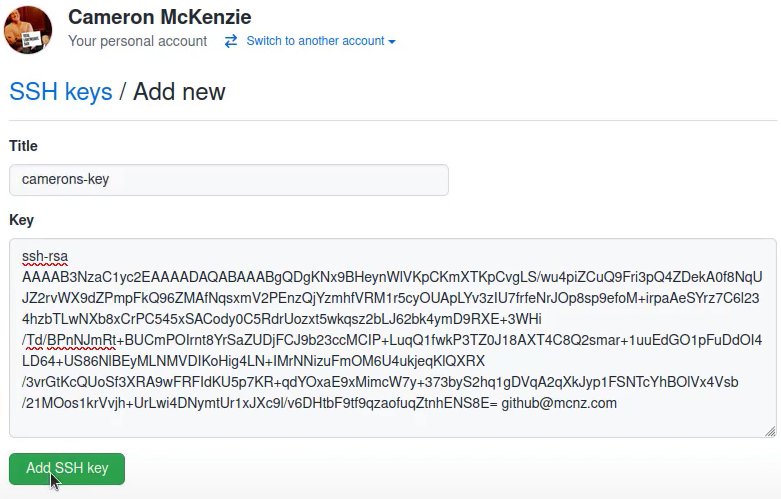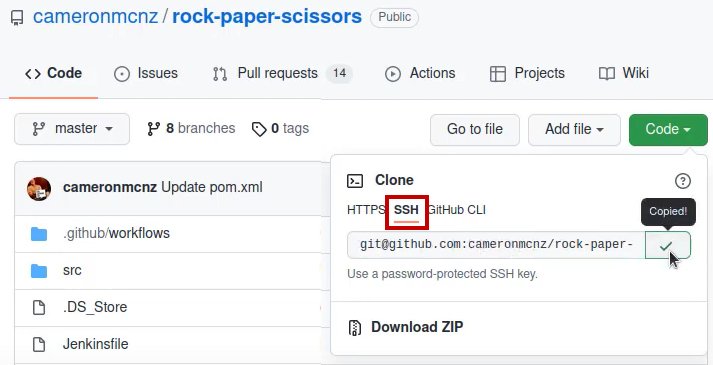How to setup SSH in GitHub by example
One of the most secure ways to communicate across the public internet is to use SSH. This is why GitHub SSH key setup is a top priority for users of the popular Git service.
Fortunately, the GitHub and SSH key configuration process is relatively straightforward on both Linux and Windows distributions.
Steps to setup GitHub SSH connections
To setup GitHub SSH keys and use them on both Ubuntu or Windows, follow these steps:
- Create a GitHub SSH key pair with the ssh-keygen command.
- Copy the value of the public SSH key to the clipboard.
- Login to GitHub and navigate to your account settings.
- Click on the link for SSH and GPG keys.
- Click Add Key to register the public SSH key with your account.
- Name the key and paste the copied value into the text field.
- Save your changes.
- In your Git client, use the SSH-based GitHub URL to clone your repo.
Let’s go over each of these steps to setup GitHub SSH keys.
Create GitHub SSH keys
In Ubuntu and Windows, the SSH keys you generate for GitHub must go in a folder named .ssh under the user’s home directory. Perform the GitHub SSH key create operation in this folder:
github@ubuntu:~$ cd ~/.ssh
Use the ssh-keygen command to create GitHub SSH key pairs:
github@ubuntu:~/.ssh$ ssh-keygen -o -t rsa -C "[email protected]"
The operation then prompts you to choose a location in which to save the public and private keys. Just click Return to leave them in the .ssh folder. The SSH command looks here when a connection attempt is made to a remote server.
The ssh-keygen command also asks you to protect your GitHub SSH key with an optional passphrase. It’s permissible to leave the passphrase blank, so click Return when prompted.
Connect to GitHub with SSH
Here is the full output when you issue the ssh-keygen command to create GitHub SSH keys:
github@ubuntu:~/.ssh$ ssh-keygen -o -t rsa -C "[email protected]" Generating public/private rsa key pair. Enter file in which to save the key (/home/ubuntu/.ssh/id_rsa): Enter passphrase (empty for no passphrase): Your identification has been saved in /home/ubuntu/.ssh/id_rsa Your public key has been saved in /home/ubuntu/.ssh/id_rsa.pub The key fingerprint is: SHA256:g7RTuw9S+... The key's randomart image is: +---[RSA 3072]----+ | ..Bo+.+o.. | |. *.= +E . . | | ...+ .. . . | | +.. ...+ o | | B o ++ S | | o . * = o + | | o B.oo . | | = oo + | | .o .o . | +----[SHA256]-----+
The purpose of the parameters used with the GitHub ssh-keygen command are as follows:
- The -o flag forces the tool to generate SSH keys with the OpenSSH format.
- The -t flag specifies the type of SSH keys to create.
- The -C flag allows for comments that get added as metadata at the end of the public key.
GitHub SSH key location
When the GitHub SSH key create operation completes, the Ubuntu terminal displays a very satisfying piece of randomart.
By default, the public and private GitHub SSH keys are placed in a folder named .ssh under the user’s home directory.
You will need to paste the contents of your public SSH key into GitHub. On Ubuntu you can cat the file to view its contents in the Ubuntu Terminal and then copy it. On Windows, just open the file with a text editor.
github@ubuntu:~/.ssh$ cat id_rsa.pub ssh-rsa AAAAB3NzaC1yc2EAAAADAQABAAABgQCwrUzqtm 3K9YNI2WbXxkcfnHZgyW7/3WXghBbKndhbKbCR00JLfTHsK Kaz17c4xIHQrw7u0GsPXai6pMtwMeVmXQH00L5hD0WE5Ioo
| Git, GitHub & GitHub Copilot Certification Made Easy |
|---|
| Want to get certified on the most popular AI, ML & DevOps technologies of the day? These five resources will help you get GitHub certified in a hurry.
Get certified in the latest AI, ML and DevOps technologies. Advance your career today. |
GitHub SSH key config
Next, you must configure the GitHub SSH key in the settings of your online account. Log into GitHub, navigate to your account settings, and find the link named “SSH and GPG keys.” Click on this link to create a new GitHub SSH key. Provide a unique name and paste the value of the private GitHub Desktop SSH key you copied earlier.
With the GitHub SSH key setup complete, you can now use the SSH repository GitHub URL to clone from and push to your remote repo.
I will copy the SSH URL of my GitHub repository named rock-paper-scissors and then clone it.
SSH Clone of GitHub repo
Once you copy the SSH URL of the GitHub repo, you can use it to clone a copy of the remote repo into the local environment.
On the initial clone, you might get a message that questions the authenticity of the host. This is due to the lack of a third-party certificate authority to validate your keys. If you are confident in the validity of the keys you just created — which you certainly should be, because you created them — just type yes to carry on with an SSH clone of the GitHub repo.
github@ubuntu:~$ git clone [email protected]:cameronmcnz/rock-paper-scissors.git
Cloning into ‘rock-paper-scissors’…
The authenticity of host ‘github.com (140.82.114.3)’ can’t be established..
Are you sure you want to continue connecting (yes/no/[fingerprint])? yes
Warning: Permanently added ‘github.com,140.82.114.3’ (ECDSA) to the list of known hosts.
Resolving deltas: 100% (206/206), done.
Now the GitHub SSH keys are set up properly and you’ve used them to clone the repository. You can continue to issue various Git commands with no worries about the underlying SSH config. All subsequent operations will use the existing setup of SSH keys for GitHub.
And that’s how easy it is to setup GitHub SSH keys in both Ubuntu and Windows for Git and GitHub.
Cameron McKenzie is an AWS Certified AI Practitioner, Machine Learning Engineer, Solutions Architect and author of many popular books in the software development and Cloud Computing space. His growing YouTube channel training devs in Java, Spring, AI and ML has well over 30,000 subscribers.






